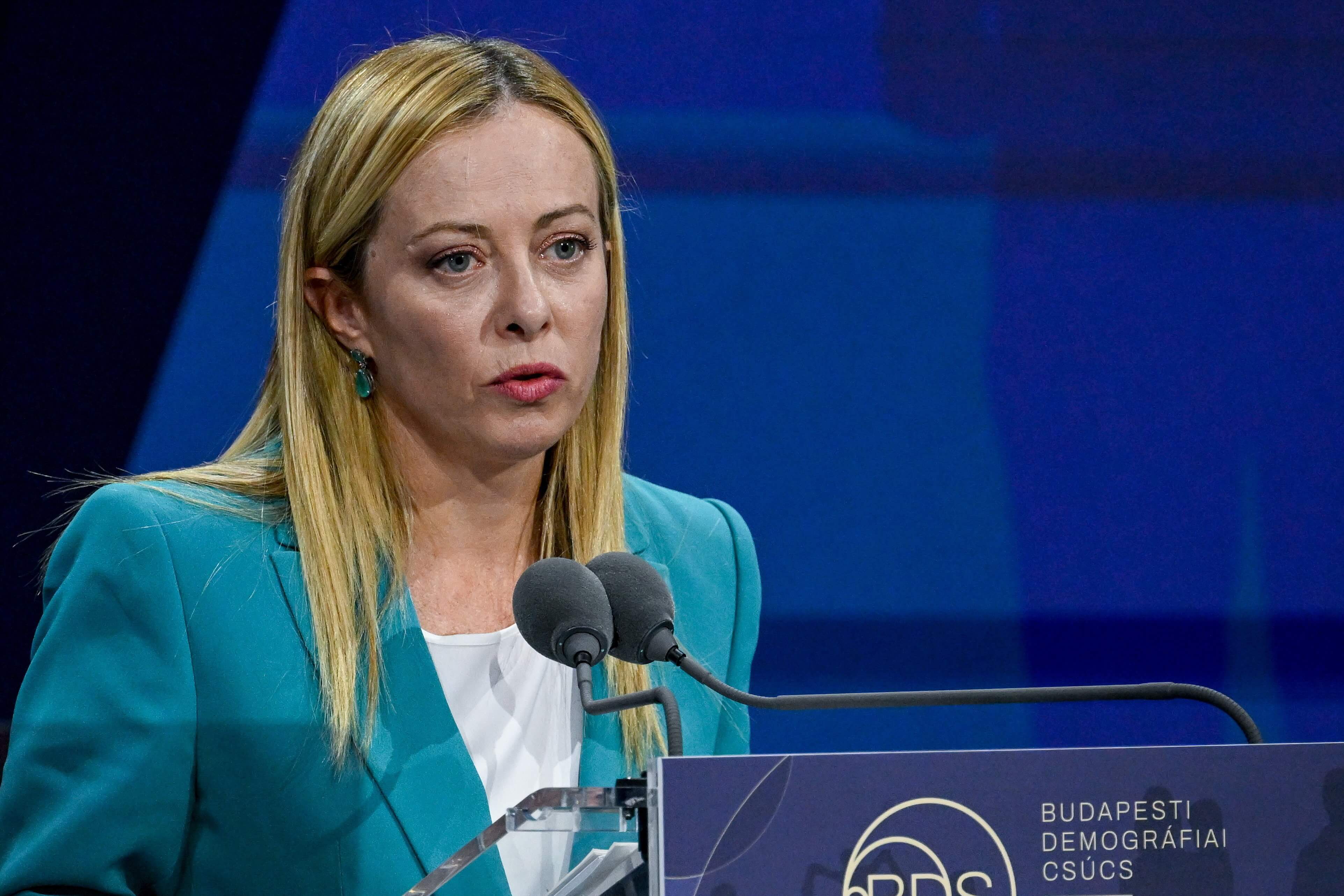Family Policy 2.0 is Coming in Hungary, Orbán Announced at 5th Budapest Demographic Summit
- 15 Sep 2023 7:40 AM
- Hungary Matters

Orbán said the Hungarian government was preparing to draft the country’s “family policy 2.0”, and called on participants to “turn European family policy around together.”
Liberals’ attacks against Hungary for its pro-family, conservative and patriotic policies are in vain, “that only make us tougher – there will be no change,” Orbán said.
He welcomed the participants, saying that the large number of visitors showed “how the matter of families and children moves people everywhere in the world.” Since the last summit two years ago, „the world has changed, and we now live in the shadow of war,” he said.
At the same time, he welcomed that right-wing parties and Prime Minister Giorgia Meloni won the elections in Italy. “We thought Italy would never have a patriotic, family-loving,
Christian government again.” Orbán agreed with Meloni that Europe’s future was in families, and that “it is important for children to have a father and a mother. “He said Italy and Hungary were both the “homeland of freedom fighters”.
Orbán Greets Intl Politicians at Summit

Prime Minister Viktor Orbán greeted the Chairman of the Azeri parliament, the Serbian president of Bosnia and Herzegovina and the Bulgarian president at the Budapest Demographic Summit on Thursday.
Bulgarian President Rumen Radev is the “guarantee for stability in Bulgaria”, an important ally of Hungary in the fight against illegal migration and in protecting energy security, he said.
Orbán said Europe was led by a progressive liberal elite “busy with all kinds of nonsense” instead of important European issues, such as the future of the continent’s demography.
He cited a survey of the Matthias Corvinus Collegium, which said that European surveys were biased towards “the fears of the progressive political elite” and did nothing to probe the real concerns of Europeans.
“This is the most worrying development in the West in the past 70 years,” he said.
Leaders may have “no idea of the real problems of real life” in a dictatorship, but that is unimaginable in a western democracy, he added. European citizens want to be able to start families in safe homes, to raise their children in peace and security.
These are “demographic issues, which continue to be far down on the agenda in European politics.” Orbán said the root of that phenomenon was that liberals had “hacked” the political life in the West.
Western political life, “the discourse, the outlook, the way of thinking, the interpretation framework of how the world works,” has been hacked by the liberals in two steps, he said.
The first step was spreading the view that the individual was the most important thing in the world. “They see dictators in everyone who sets boundaries to their individual wishes,” he said.
Those boundaries, however, are also rail guides, he said. The boundaries of family life “are essential for freedom; freedom requires at least two people, one person alone is not free but lonely.”
Liberals also tried to “hack” European life by „spreading strategic fears of the future”, the prime minister said.
“Liberals strive to keep irrational fears from the future on the agenda, and to magnify them,” he said. Liberals expect people to live submitting all their actions to an impending apocalypse,” he said.
Orbán said “the mindset” of a community was something that defined the future. He added, however, that the western way of thinking prevented the Europeans from being able to identify the most important challenge facing them which he said was demography.
He said that instead of addressing the issue of demography, politicians were focusing their attention on how to enforce carbon quotas in the economy and gender quotas in society.
“Europe is acting out of fear and fear turns us into defeatists. We say there is no future which thus will become a self-fulfilling prophecy,” Orbán said.
The prime minister called Hungary “an incubator house” of conservative policies which he said covered such areas as a labour-based economy, a modern cooperation of state and church and a patriotic education policy.
Speaking about Hungary’s demographic policy, the prime minister listed five goals. Those include promoting the advantages of raising children, government incentives supporting home-building, giving mothers priority “as the pillars of family policy”, turning the entire country’s operation into a family-friendly direction and protecting families with laws.
Speaking about the achievements of his government that took power in 2010, Orbán noted that the per capita income of families raising a child had doubled and that of families raising more children had tripled.
He said that a government subsidy scheme had helped every fifth family to buy a new home. Among the family support measures, he noted the personal income exemption for mothers under 30 and the personal income tax exemption for mothers with four children.
The personal income tax exemption will be extended to families with three children, he said.
“We would normally not admit it, but in Hungary women keep the families together,” Orbán said and praised women for their achievements.
He said the most important teaching of Hungarian family policy is that “if you want a future for your country, you must support mothers”.
Orbán said that Hungary’s constitution protected the institution of marriage as a union based on a voluntary decision between a man and a woman, as well as the family which forms the basis for the survival of the nation.
The present first phase of Hungary’s family policy is concluded, now the next phase can begin, Orbán said.
“We have earned a lot of appreciation for what we have done so far, but we consider this to be insufficient, so we must move on,” he said. Orbán said that “we have no chance to convince the present progressive, liberal elites … we must push them aside”.
The post-liberal era replacing progressive liberalism “is not going to introduce itself, somebody will have to do it,” he added. “And who is going to do that if not us?”
Such a change would require conservative pro-family forces to take power in as many European countries as possible, the prime minister said.
Orbán said that “we have everything to turn the balance of power to our advantage” at the European Parliament elections next year. “In the meantime, we, Hungarians have to do our homework and draft ‘programme 2.0’ of Hungarian family policy,” the prime minister said.
Meloni: Demography the Issue that Defines a Nation's Future

Demography is not simply one of the main issues, it is an issue on which the future of a nation depends, Giorgia Meloni, the Italian prime minister, said in her address to the 5th Demographic Summit in Budapest,
She said it was a top priority of her government to bring about a fundamental cultural change as regards the approach towards family affairs in Italy which, just as the rest of the western world, is hit by a serious demographic crisis.
The number of births fell, and a strong anti-family atmosphere has developed; the image of the family gradually faded in the media and has been taken over by individuals as consumers.
“We live in an era when the most important elements of our identity are under attack, and yet without this identity we are just numbers, tools in the hands of others”, she said.
Fewer and fewer children are being born in Europe, so resources must be mobilised to support families, as Hungary perfectly exemplifies, the Italian prime minister said.
Thanks to the government’s efforts, Hungary has managed to reverse the deteriorating fertility rate, the number of marriages and the number of the employed has increased, and, very importantly, the number of the employed among women increased, Giorgia Meloni said.
She said the Hungarian example shows that with a family-friendly policy, women do not have to choose between work and family. Real freedom is when women can choose to have children alongside work, and Hungary is a good example for this, Meloni said. Many people believe that migration can help ensure prosperity, she said, adding that she did not accept this view.
Nations must assume responsibility for their own future, she argued. Meloni said she had been shocked by the recent controversies related to the 1956 uprising against the Soviets.
“1956 was not only an uprising against a foreign power, but also an uprising against those who wanted to destroy the foundations of Hungarian identity: family, national identity, and religion,” she said.
There are pages of history that cannot be rewritten, she said. “We see the same thing in Ukraine today, and this cannot be accepted,” Meloni said.
Bulgarian president Rumen Radev said the rivalry between societies in the digital 21st century will no longer be about territory, but about human capital, as this is the most important value.
He noted that over the past ten years his country lost 12% of its population, largely due to emigration. Expanding the family support system will help support this, but the most important thing is to strengthen the rule of law and fight corruption, he said.
Orbán Holds Talks with Italian Counterpart

Prime Minister Viktor Orbán and Italian counterpart Giorgia Meloni met in Orbán’s office on Thursday to discuss the most important European and international issues, and the excellent bilateral relations between Rome and Budapest, Orbán’s press chief said.
Commenting on the Budapest Demographic Summit, they reiterated the importance of pro-family policies, also in light of the demographic challenges facing Europe, he said.
The two prime ministers condemned Russian aggression in Ukraine and called for peace. They noted the support granted to Kiev and stressed the importance of maintaining European unity in support for Ukraine.
Commenting on migration, they reiterated that fast and resolute action was needed. Migration is a common challenge for the European Union and requires a collective response, the prime ministers said. In order to prevent people from leaving their homes, it is necessary to focus on the external dimension, such as political and economic support to origin countries and the fight against human smuggling networks, they said.
The prime ministers expressed their commitment to maintaining close cooperation between their respective governments, with special regards to the Hungarian presidency of the EU in the second half of 2024, the statement said.





























LATEST NEWS IN current affairs